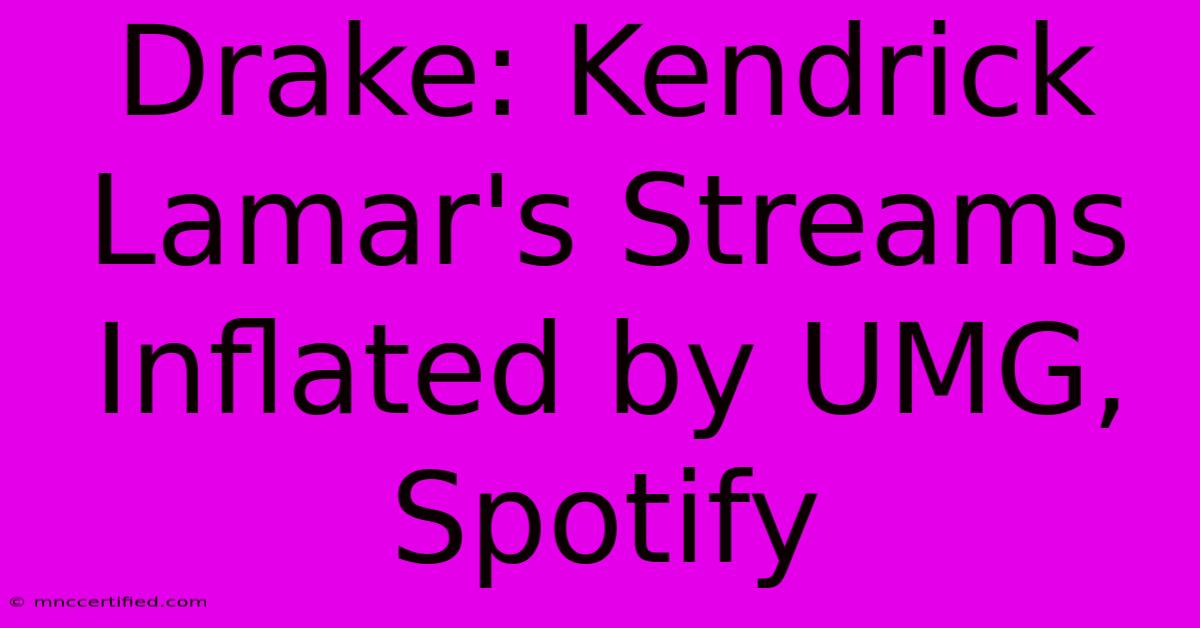Drake: Kendrick Lamar's Streams Inflated By UMG, Spotify

Table of Contents
Drake: Kendrick Lamar's Streams Inflated by UMG, Spotify? Unpacking the Claims
The music industry is a complex beast, and accusations of stream manipulation are nothing new. Recently, allegations have surfaced suggesting that Kendrick Lamar's streaming numbers might be artificially inflated, potentially benefiting from practices involving Universal Music Group (UMG) and Spotify. While these are serious claims, it's crucial to examine the evidence and understand the complexities before jumping to conclusions. This article delves into the controversy surrounding Drake's comments and explores the potential implications for the music industry.
The Drake Allegation: Fueling the Fire
The controversy initially gained traction through comments seemingly made by Drake, though the exact nature and context of his statements remain somewhat ambiguous. Reports indicate he alluded to UMG and Spotify engaging in practices that inflated Kendrick Lamar's streaming numbers, giving him an unfair advantage. The lack of concrete evidence from Drake himself has led to much speculation and debate within the industry and online.
The Lack of Transparency: A Breeding Ground for Suspicion
The opaque nature of streaming data analysis adds fuel to the fire. The exact methods used to calculate and report streaming numbers are often proprietary, making independent verification difficult. This lack of transparency makes it challenging to definitively prove or disprove accusations of manipulation, leading to skepticism and conspiracy theories.
Understanding the Potential Mechanisms of Stream Inflation
While the specifics remain largely unconfirmed, several potential mechanisms for stream inflation have been discussed:
1. Botted Streams and Artificial Plays:
This involves using automated bots or programs to generate artificial streams, inflating an artist's total numbers. While platforms have measures in place to detect and remove botted streams, the sheer scale of streaming data makes it challenging to entirely eliminate this practice.
2. Strategic Playlist Placement:
UMG, as Kendrick Lamar's label, has significant influence over playlist curation on Spotify. Accusations suggest that Lamar's music might have been strategically placed on high-traffic playlists, boosting his streams disproportionately. While strategic playlist placement is a legitimate promotional tool, concerns arise when it appears to be manipulated beyond standard practices.
3. Internal Data Manipulation: A Conspiracy Theory?
The most extreme (and largely unproven) claims suggest the possibility of internal data manipulation within UMG or Spotify. This would involve directly altering streaming figures, a practice that would be incredibly difficult to conceal and would have severe legal consequences if proven true.
The Impact on the Music Industry: Fair Play and Competition
The controversy raises significant questions about fair play and competition in the music industry. If stream counts are being manipulated, it undermines the integrity of the charts and rewards artists who engage in questionable practices. This can discourage artists who prioritize genuine artistic merit and organic growth, leading to a distorted representation of musical popularity.
The Need for Transparency and Accountability
The music industry desperately needs greater transparency regarding streaming data and the algorithms that govern playlist curation. Independent audits and increased accountability from streaming platforms and labels are crucial to ensure a level playing field for all artists. Without such measures, accusations of manipulation will likely persist, eroding trust in the system.
Conclusion: More Questions Than Answers
While Drake's comments ignited a storm of controversy surrounding Kendrick Lamar's streaming numbers, the lack of concrete evidence leaves many questions unanswered. The debate highlights the critical need for greater transparency and accountability within the music industry's streaming ecosystem. Only through increased scrutiny and improved regulatory practices can we ensure fairness and integrity in the representation of musical success. The ongoing investigation, if any, will be crucial in determining the validity of these allegations.

Thank you for visiting our website wich cover about Drake: Kendrick Lamar's Streams Inflated By UMG, Spotify. We hope the information provided has been useful to you. Feel free to contact us if you have any questions or need further assistance. See you next time and dont miss to bookmark.
Featured Posts
-
Unsolved The Jon Benet Ramsey Murder
Nov 26, 2024
-
Can You Powder Coat Over Bondo
Nov 26, 2024
-
Bessent For Treasury Under Biden
Nov 26, 2024
-
Clippers Vs Celtics Watch Party
Nov 26, 2024
-
Villager Trading Hall Schematic
Nov 26, 2024